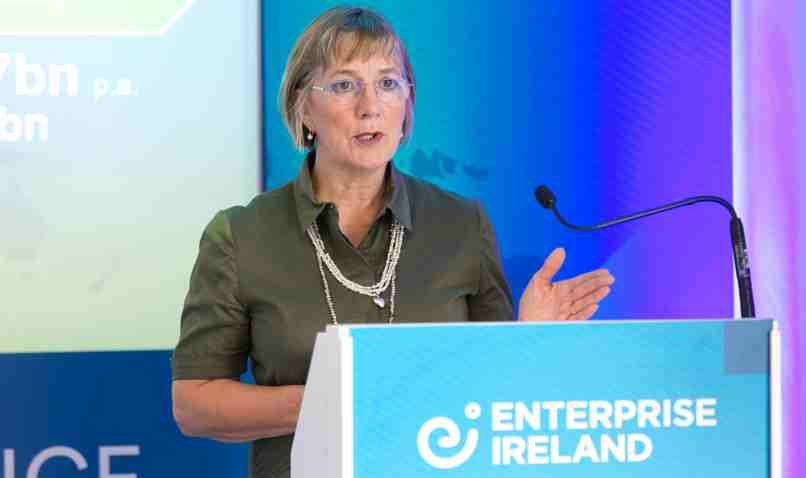A government review of spending by Enterprise Ireland has shown that the agency approved €780m of capital, employment and training grants between 2006 and 2018.
The agency gave €730m of taxpayer funding to almost 6,000 separate firms during that period, involving almost 13,000 approvals, and a further €52m to 39 non-profit entities in 77 awards.
The Spending Review, Focused Policy Assessment of Capital, Employment, and Training Supports, was carried out by the Department of Business, Enterprise and Innovation, which oversees Enterprise Ireland and IDA Ireland.
The review was not concerned with a value for money assessment of the massive annual taxpayer subsidies for business. Unsurprisingly, the in-house review finds that the cash supports are working well and producing enhanced results for the beneficiaries.
“The client offers associated with company expansion supported incremental sales, with the results indicating that firms increased overall sales of up to approximately 12% and export sales of up to approximately 11% in net terms in comparison to non-assisted firms. Furthermore, a benefit-to-cost ratio of 2.8 to 1 was estimated for company expansion offers,” the report states
However, the department concedes that the evidence base used in the evaluations had some limitations in terms of the coverage of the suite of client offers and in terms of the time periods for which the available evaluations were focused. The review acknowledges that the evaluations were undertaken based on evaluation of individual client offers that did not take into consideration the context of firms receiving multiple support types that are channeled through single or multiple client offers to firms over time.
The net result of these limitations, says the department, is that the review could not definitively identify the causal relationships between support type or client offer and the impact measured. Even so, the review concludes that EI's payments are “efficient, effective, and aligned with and appropriate to the evolving national economic and enterprise policy context”.
To address the deficiencies in the available evidence, the government’s Economic and Evaluation Service proposes that the department will “develop a schedule of evaluations for CET supports from 2020 onwards, with a particular focus on the gaps identified in this focused policy assessment”.
According to finance minister Paschal Donohoe, the Spending Review of Enterprise Ireland and IDA Ireland was not concerned with reducing expenditure. The minister said the the aim of the process is to create space within expenditure ceilings to fund new initiatives through systemic review of the existing cost base.
Evidence Base Limitations
The Spending Review also states that in the 2006 to 2018 period, IDA Ireland approved €1.07 billion of taxpayer funding in supports, made up of €430m in capital grants to 204 firms, €460m in employment grants to 357 firms, and €180m in training support to 265 firms.
The review states: “The evaluations evidence base had a number of limitations in terms of the time periods for which the available evaluations were focused. A data availability issue arising from the small cohort of firms available for analysis in the evaluations made it more difficult to identify definitively the causal relationships between supports and the impacts measured.
“Developing a better understanding of the causal relationships between enterprise supports types and the impacts measured would help in informing DBEI and IDA on future direction of funding.”
However, the overall conclusion is that evaluations of IDA CET supports point to positive outcomes, in terms of employment, sales and value added in FDI firms.
“For example, for firms in receipt of employment supports, the average employment for the group three years post-grant approval was 33% higher than in the three years pre-grant approval, and for a similar set of IDA clients not in receipt of supports it was 0.1% lower. A positive benefit-to-cost ratio of 1.45 to 1 was estimated for capital and employment supports when a deadweight of 70% was applied in the estimation," the report claims.
“Additionally, companies considered that IDA capital and employment supports were vital or very important to their investment decisions. The mix of incentives, of which CET supports are part, were seen as being a key element to retain Ireland’s attractiveness for FDI.”
The full review is available here.
Photo: Julie Sinnamon, CEO of Enterprise Ireland. (Pix: Shane O'Neill/SON Photographic)
| RECENT IDA IRELAND STATE AID | ||
| Beneficiary | State Aid (€) | Grant Date |
| QT Technologies | 5,083,118 | 07/09/2018 |
| Genesys Telecommunications | 3,032,075 | 14/11/2018 |
| Almac Pharmaceuticals | 2,571,750 | 20/08/2018 |
| Fisc-Ireland Ltd | 1,568,348 | 30/11/2018 |
| Jaguar Land Rover Ireland | 2,592,622 | 20/12/2018 |
| Medtronic Vascular Galway | 7,500,000 | 10/01/2019 |
| Software Pipeline Ireland Ltd | 1,939,541 | 23/10/2018 |
| Gencell Biosystems | 1,491,238 | 04/12/2018 |
| Aptiv Global Operations | 6,000,000 | 20/12/2018 |
| Eirgen Pharma | 1,059,028 | 17/12/2018 |
| Canada Life Assurance | 2,223,382 | 02/08/2018 |
| Verizon Services | 982,490 | 16/08/2018 |
| Neueda Technologies | 1,908,000 | 06/09/2018 |
| Edwards Lifesciences | 7,500,000 | 27/09/2018 |
| Veritas Storage | 6,315,037 | 20/09/2018 |
| Intaricia Ireland | 7,500,000 | 27/09/2018 |
| Wuxi Biologics | 7,500,000 | 05/09/2018 |
| L.M.Ericcsson | 7,444,584 | 25/10/2018 |
| Johnson & Johnson Vision Care | 3,489,334 | 16/11/2018 |
| Johnson & Johnson Vision Care | 1,154,900 | 16/11/2018 |
| Gencell Biosysems | 1,491,238 | 04/12/2018 |
| Quidel Ireland | 600,000 | 04/01/2019 |
| Valeant Pharmaceuticals | 4,033,929 | 15/02/2019 |
| Intel R&D Ireland | 3,000,000 | 11/02/2019 |
| Clearstream Technologies | 2,049,859 | 11/02/2019 |
| Accenture Global Solutions | 1,507,106 | 11/02/2019 |
| ON Semiconductor | 886,358 | 28/02/2019 |
| Borderfree Ltd | 1,082,757 | 22/02/2019 |








